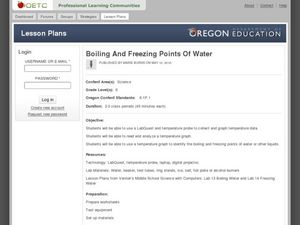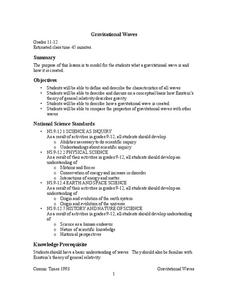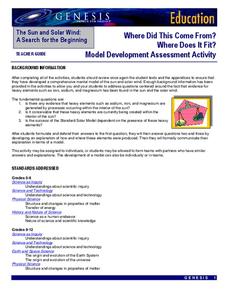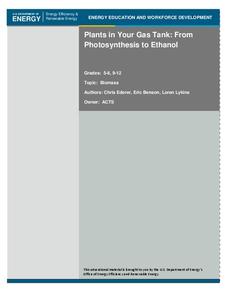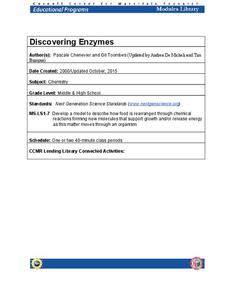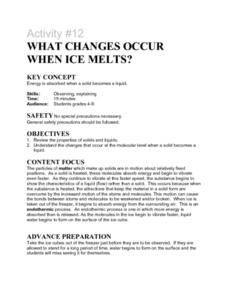Curated OER
Boiling and Freezing Points of Water
Challenge your sixth graders with this instructional activity about the freezing and boiling points of water. In these activities learners graph temperature data, read and analyze information, and identify the freezing and boiling points...
Curated OER
Water Cycle Reading and Writing
After listening to a story about the water cycle, learners create their own versions of this tale. This is a great way to have your class review the concepts of evaporation, condensation, precipitation, and runoff.
CPO Science
The Periodic Table
Here is a six-page exploration that will spark interest in the periodic table of elements. After reading a diagram-supported explanation of the periodic table's organization, pupils answer questions to familiarize themselves with it. To...
Wild BC
The Greenhouse Effect: Warming the Earth Experiment
First in a two-part lesson on the greenhouse effect, this lesson involves a classroom demonstration of the phenomenon, and a lab group experiment with color and absorption. Although there are easier ways to demonstrate the greenhouse...
Virginia Department of Education
Solution Concentrations
What happens when you combine 6.022 times 10 to the 23 piles of dirt into one? You make a mountain out of a mole hill. Scholars use dehydration to obtain percent composition and then calculate the molarity of the original...
It's About Time
The Electricity and Magnetism Connection
Magnets don't grow in fields, but magnetic fields are important to understand. The lesson covers the effect electricity has on magnetic fields. Scholars use a compass, magnets, and electrical wire to test magnetic fields and energy...
NASA
Gravitational Waves
Young scientists participate in a hands-on experiment to explore Einstein's theory of relativity in a creative manner. They investigate various waves and compare their characteristics as they discuss how each wave is created....
Charleston School District
Solving Equations with Infinite or No Solutions
Where did all the variables go? Scholars learn how to interpret an equation when they eliminate all variables during the solving process. They interpret the solution as infinite solutions or no solutions.
Santa Monica College
Single and Double Displacement Reactions
If you aren't part of the solution, you are part of the precipitate! Young chemists learn about single and double displacement reactions including precipitation reactions, neutralization reactions, and gas forming reactions. They perform...
NASA
Model Development Assessment Activity
Time to show off what they've learned! The final lesson in the series of six asks young scholars to process their learning from the previous lessons. They identify possible elements of the sun as well as a possible origin.
Glynn County School System
Solar System Formation and Extra-Solar Planets
Has the solar system always been like it is today? A lesson presentation begins with a discussion of the formation of our solar system. It continues with a compare and contrast of the inner and outer planets.
Purdue University
Design of a Door Alarm
How does electricity work? Budding scientists explore the concepts of electrical currents and open and closed circuits with class discussion and a hands-on activity using a battery to turn on a light bulb. Learners also make predictions...
Curated OER
Scientific Detectives
Middle schoolers examine the legitimacy of advertisers' claims about products using science and critical thinking. They view and discuss ads, read a case study, and conduct an experiment to demonstrate whether a product lives up to its...
Curated OER
Plants in Your Gas Tank: From Photosynthesis to Ethanol
Explore ethanol and how it is produced. Young scientists investigate photosynthesis and fermentation to the concept of conservation of energy and mass. They discuss the environmental and economical benefits of ethanol as a fuel additive.
Lewiston High School
Weight and Mass & Forces in Equilibrium
I would weigh less on the moon? Send me there, then! On the top of the first page, a cartoon image demonstrates the difference between Earth and the moon. It then goes on to describe weight and mass and provides five practice problems...
Curated OER
Water Cycle Reading and Writing
Here is a great way to get pupils to express a scientific concept in a fun way. After hearing the story of Walter the Water drop and learning facts about the water cycle, the class will write a creative expository piece describing what...
Curated OER
Circuit Diagrams: Switching Circuits
Use a lab sheet on circuit diagrams in your electricity unit. Fifth graders draw two series circuits with diagrams, based on two examples. A science experiment prompts learners to use 3x5 cards to illustrate the way a series circuit works.
American Chemical Society
The Discovery of Fullerenes
Carbon is the most common element on earth, so the innovative discovery of a new type of carbon molecule won the 1996 Nobel Prize. In the ready-to-go lesson, scholars learn about C60 and how it has opened up the entire area of...
Lawrence Hall of Science
Photolithography
Examine the use of photolithography in the fabrication of circuit boards and other components. An advanced activity teaches pupils a process for transferring a pattern onto a surface. Using UV light and a light reactive substance,...
Cornell University
Discovering Enzymes
Explore the function of enzymes through a series of lab investigations. Learners use household enzymes such as hydrogen peroxide to model the role of enzymes. The enzymes break down proteins with and without a catalyst.
Cornell University
Light Waves: Grades 6-8
Explore the behavior of light with different materials. Collaborative groups determine whether certain materials absorb, reflect, diffract, or transmit light waves. They then measure the angle of incidence and angle of reflection.
Cornell University
Beam Focusing Using Lenses
Explore optics using an inquiry-based experimental approach! Young scholars use a set of materials to design and build a unit capable of focusing a beam of light. They experiment with different lenses to determine the best approach to...
Kenan Fellows
What Is Heat?
If objects have no heat, how do they can gain and lose it? Scholars experiment with heat, temperature, and specific heat of various substances. They create definitions for these terms based on their own conclusions to complete the fourth...
Curated OER
What Changes Occur When Ice Melts?
Young scholars explore the physical process of melting. They observe melting ice and answer questions related to energy transfer during phase changes.
Other popular searches
- Properties of Matter
- Physical Properties of Matter
- Properties of Matter Song
- Useful Properties of Matter
- Science Properties of Matter
- Properties of Matter Booklet
- Properties of Matter Lecture
- Compare Properties of Matter
- Chemical Properties of Matter
- Social Properties of Matter
- Properties of Matter Test
- Intensive Properties Matter
